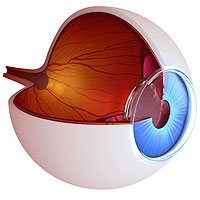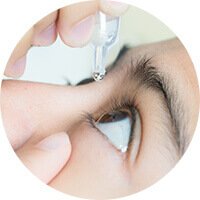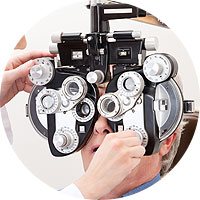Macular degeneration, also called age-related macular degeneration, is a common cause of vision loss in older adults. This eye condition slowly destroys central vision but leaves your peripheral or side vision intact.
Although macular degeneration isn’t reversible, treatment can slow its progression. Keep reading to learn more about macular degeneration and whether you can stop its progression!
What is Macular Degeneration?
Macular degeneration is an eye condition that affects your macula. The macula is a specific spot on the light-sensitive retina.

The retina is the internal back layer of your eye that receives and sends incoming light to the brain, enabling you to see. The macula is responsible for your central, fine-detail vision.
It allows you to recognize faces, drive, read, cook, watch TV, and perform other activities that require sharp, straight-ahead vision. Without treatment, macular degeneration can lead to loss of central vision.
Central vision is critical as it enables you to look straight ahead and see visual details. Macular degeneration doesn’t cause complete blindness since it doesn’t affect your peripheral vision.
However, the loss of central vision can make it difficult to perform routine activities as you can’t see things directly in front of you. Timely diagnosis and treatment offer the best chance of minimizing damage.
Are There Different Types of Macular Degeneration?
There are two kinds of macular degeneration: dry and wet.
Dry Macular Degeneration
Almost all people with macular degeneration have the dry form of macular degeneration. Dry macular degeneration occurs when small yellow deposits known as drusen collect under your macula.
The buildup of drusen dries and thins the macula, causing it to lose its function. Vision loss with dry macular degeneration happens gradually.

Because of this, the symptoms are subtle initially before becoming more noticeable over time. Dry macular degeneration can change into the wet form.
Wet Macular Degeneration
A much smaller percentage of people with macular degeneration have the wet form. Wet macular degeneration progresses faster than dry macular degeneration and is more severe, although less common.
Dry macular degeneration occurs when abnormal blood vessels form under your retina. These blood vessels are very delicate and easily leak blood and fluid into your macula, causing scarring.
The pooling of blood and fluid can quickly result in the total loss of central vision. Even though wet macular degeneration is less common, it’s the most severe type.
Its effects can be very damaging to your eyesight. Wet macular degeneration often requires treatment to help prevent vision loss and further progression of the condition.
What are the Symptoms of Macular Degeneration?
Early on, macular degeneration will likely not cause any symptoms. That’s because the condition is painless and usually progresses slowly.

By the time you notice any vision changes, the condition is usually at a more advanced stage. You may experience:
- Blurred vision
- Colors looking dull
- Difficulty recognizing faces
- Difficulty seeing in low light
- Objects seeming smaller than normal
- Straight lines appearing wavy or crooked
- Dark or blank spots in your field of vision
- Decreased central vision in one or both eyes
- Need for brighter light when performing up-close activities
- Loss of central vision
Are you experiencing symptoms of macular degeneration?
What Treatment is Available For Macular Degeneration?
Although there is no way to cure macular degeneration, certain treatments can delay the progression of the eye condition and prevent severe vision loss. They include:
Nutritional Supplements
In the early stages of macular degeneration, dry macular degeneration, your eye doctor may recommend taking certain nutritional supplements. AREDS2 are vitamins and minerals that may help slow the progression of dry macular degeneration.
These include:
- Vitamin C
- Vitamin E
- Zeaxanthin
- Lutein
- Copper (as cupric oxide)
- Zinc (as zinc oxide)
These supplements are rich in antioxidants. Taking them daily helps support your macula cells, minimizing deterioration.
Anti-VEGF Drugs
In more advanced cases of macular degeneration, retinal injections may be necessary to prevent further damage to the macula.
These medications are called anti-VEGF. Anti-vascular endothelial growth factor (anti-VEGF) medications include:
- Aflibercept (Eylea)
- Bevacizumab (Avastin)
- Ranibizumab (Lucentis)
- Pegaptanib (Macugen)
During the treatment, your ophthalmologist will inject the medication directly into the back of your eye. Anti-VEGF drugs neutralize the activity of VEGF, a protein in your body responsible for the growth of leaky blood vessels.

This inhibits the formation of fragile blood vessels and stops leaking from these vessels. It might take a couple of weeks before you notice any difference.
The effects of anti-VEGF injections last for only a short while. So, you’ll likely need repeat anti-VEGF shots to maintain the benefits of the treatment.
Anti-VEGF injections may prevent your eyesight from worsening and sometimes improve your vision.
Photocoagulation
For this treatment, your eye doctor will place a mirrored contact lens in your eye. The particular contact lens allows your ophthalmologist to aim a high-energy laser precisely at problem blood vessels.
The heat generated by the laser beams closes off the leaky vessels.The treatment stops the vessels from leaking. Stopping the bleeding can reduce additional damage to your macula, which may prevent further vision loss.
That said, blood vessels can regrow. So you may require additional treatments.
Few people with wet macular degeneration can get this treatment. It usually isn’t an option if the leaky blood vessels are directly under the center of your macula.
Safeguard Your Sight from Macular Degeneration
Macular degeneration can significantly impact your vision and your quality of life. That’s why regular eye exams at Eye Care Specialists are so important.
Early detection and treatment of macular degeneration is crucial to slowing the eye condition, preventing severe vision loss, and preserving your remaining sight.
Are you experiencing symptoms of macular degeneration? Schedule an appointment at Eye Care Specialists in Berwick, Bloomsburg, Dallas, Hazelton, Kingston, Nanticoke, or West Pittston, PA, today!

















